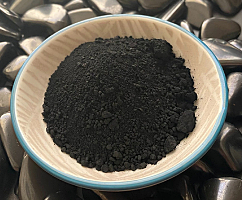Currently Empty: $0.00

At Shungite Masters HQ we have been experimenting in our secret laboratories (aka our kitchen)
Shungite pastes can be used to normalise skins condition, strengthen the protective properties of the epidermis, accelerate the healing of wounds and scars, reduces painful sensations, restores the intensity of blood flow, cleanses the skin of toxins, heals allergic skin, eczema, and other dermatological diseases, so using it in a soap is an ideal solution.


Natural Shungite powder does not cause allergic reactions, so if you have very sensitive skin, you can safely use it. The powder itself is free of fragrances, chemical additives, and stabilisers – all completely natural.
To make this soap I used a simple melt and pour base, just for ease and simplicity. My base was a Crystal Oat Shea butter base that I have used before. I like that it is simple to use, fairly low tox, vegan, not tested on animals etc. The oats and shea butter are mildly moisturising to the skin.
I added some organic aloe vera gel, olive oil, some good quality frankincense essential oil, and half a teaspoon of Shungite Powder. Don’t be restricted by my suggestions though, and feel free to experiment yourself.
Note
One thing to note though is to make sure you use a fine powder as you don’t want it to be too abrasive on your skin. Our Shungite powder is 25 microns, so it is nice and fine for soaps, creams and balms. To purchase click here
Just a side note to those of you haven’t used Shungite Powder before and are considering it – be very careful using it. It is worse than the initial Shungite dust that you get from new pieces of shaped Shungite – it is a very very fine powder with a similar texture to icing sugar and if you aren’t careful the fine powder can go everywhere. Unlike icing sugar it is not water soluble, so it takes AGES to wipe up! Learn from my experience.
I melted the soap down using a double boiler method. In a separate bowl I added the organic aloe vera gel, olive oil, a few drops of frankincense essential oil, and half a teaspoon of Shungite Powder.
Once the soap had completely melted, I let it cool slightly (until a skin starts to form on the top) and then added the other ingredients to it, then decanted it into my soap moulds and left it to cool and harden – easy as!
You can add more Shungite Powder if you wish, but the more you add the darker your soapy foam will be, and I was just cautious of any residue left on the skin, so I took the “less is more” approach.
I needn’t have worried though as I didn’t find that I had any dark residue after washing my hands, washing my face, or after showering using this soap.
Conclusion
Overall I’m pretty happy with how this soap turned out. Even though the soap is black (obviously due to the Shungite powder) it doesn’t leave a black residue on the skin like some of the creams and balms I have used do. Having said that, I would still avoid using white towels, just in case.
If you are a regular at making your own soaps, then trial away yourself with other recipes and bases. We would love to hear what combinations you tried, how they turned out and what your favourites are. Let us know by emailing us at [email protected], or leave a comment below.
DISCLAIMER – Shungite Masters cannot be held responsible for any black or dark reside that may be left on textiles when using this product or when making your own.


